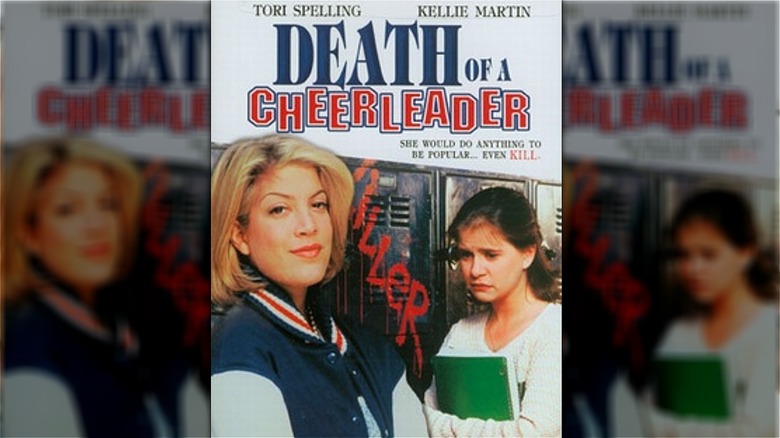The Grisly 1984 Murder Of Cheerleader Kirsten Costas That Inspired Multiple Films
On a summer night in 1984, Alex Arnold answered his door. A teenage girl with curly brown hair named Kirsten Costas stood there. She told him she'd been at a nearby church with a friend who had "gone weird," according to People. Alex's wife, Mary Jane, saw someone else at the end of their walkway — another young girl with "a roundish face and light brown hair."
When Costas couldn't get her parents on the phone, Arnold gave her a ride home to the upscale San Francisco suburb of Orinda where she lived. A mustard yellow Pinto seemed to be following them. He let Costas off at her neighbor's house, but suddenly, someone rushed at her. "I heard Kirsten scream and saw her go down," Arnold later testified (via The San Francisco Examiner). "But when the other girl's arm went up there was a flash ... I later realized she was stabbing Kirsten. She never stopped." It took nearly six months before the authorities caught Costas' killer, and the shocking details of the murder would go on to inspire a 1990s TV movie starring Tori Spelling, a reboot almost two decades later, and an avante-garde film.
Rumors and the help of the FBI
That night, June 23, 1984, the killer stabbed Kirsten Costas five times before running off and escaping in her car. Alex Arnold gave chase but couldn't catch her, according to the Ladies' Home Journal (via Click Americana). Costas managed to stumble across the street where she collapsed in a neighbor's arms. The 15-year-old was dead within an hour. The Contra Costa County Sheriff's Department came up empty, but soon rumors circulated around Miramonte High School — where Costas had been a student — about who could have done it.
The investigators questioned two of Costas' classmates — one who was into the punk music scene, and the other into heavy metal. They were innocent, but were both terrorized by locals and ended up moving away, according to "The Mammoth Book of More Bizarre Crimes." Eventually, the FBI assisted in the investigation and through profiling honed in on another suspect — Bernadette Protti, who had attended Costas' funeral, per People. Protti confessed in a letter in December to her parents that she'd stabbed Costas.
Looks or money or popularity
Kirsten Costas, described as an "all-American girl" by a family friend, was popular at school and was a member of both the swim team and cheerleading squad, according to the Oakland Tribune. While Bernadette Protti was also popular, she felt she was less so and was embarrassed by her middle-class background in the wealthy enclave of Orinda. On the night of the murder, Protti picked up Costas in her car after lying to her about an initiation dinner for the Bob-o-links, a sorority-like volunteer club that both girls had been invited to join, per the Los Angeles Times. The two argued after Costas found out the truth.
During a taped confession to the police, Protti seemed more frightened by the prospect of having to return to her high school than by the justice system. "Do I have to go back to Miramonte?" she asked the investigators, per CNN. "I can't live if it is known. I would rather die." Protti told police she was afraid Costas was going to tell their classmates she was "weird." Additionally, Protti was jealous of Costas, telling the police that she hadn't gotten on the cheerleading squad or on the yearbook staff. "The things that got me mad was it hurt and I couldn't change ... like looks or money or popularity or things," she told them (via the Los Angeles Times). Protti also alleged Costas had bullied her and constantly "put her down," according to The San Francisco Examiner.
Trial and conviction
Bernadette Protti went on trial before a judge in March 1985. By then 16 years old, the teen's taped confession took center stage. The victim's family took exception to statements that Protti made about Costas' alleged use of marijuana while they sat in her car, one of the issues that Protti said initiated their argument. "I just didn't want to, and she made me feel dumb," Protti said in her confession (via People).
The prosecution sought a first-degree murder conviction but Judge Edward Merrill said at the end of the three-day trial that they failed to prove there had been premeditation. He convicted Protti of the lesser offense of second-degree murder, per The San Francisco Examiner. "My feeling is that the law has been served," Arthur Costas said after the trial. "I'm not in agreement with the punishment, but that's my opinion. I don't believe the punishment could ever match the crime in this case. We've lost our daughter," Merrill later gave Protti a nine-year sentence to be served at a juvenile facility. At the sentencing hearing, Costas' mother, Berit, gave an emotional statement, telling the judge (via the Oakland Tribune), "Kirsten's hopes and ideals were shattered on June 23, 1984. She was attacked by Bernadette Protti and left in the street to die." At the time, the case made national headlines and eventually became fodder for television.
Death of a Cheerleader
The first appearance of the Kirsten Costas murder case on screen came in 1986 in the avant-garde film "Landscape Suicide" by the independent filmmaker James Benning, which also featured the story of the serial killer Ed Gein. In 1994, NBC — against the wishes of Kirsten Costas' family — produced a television movie about the case starring Tori Spelling, according to the Associated Press. Spelling, who'd made a name for herself in the long-running and incredibly popular teen drama "Beverly Hills 90210," played a character based on Costas in the film that was variously called "Death of a Cheerleader" and "A Friend to Die For." Kellie Martin starred as the Bernadette Protti character. At the time, Martin had been on the ABC family drama "Life Goes On."
Lifetime made a reboot of the NBC film in 2019 — also titled "Death of a Cheerleader" — starring Aubrey Peebles as the Protti character and Sarah Dugdale as Costas. Peebles is best known for her role in the ABC series "Nashville." Dugdale is on the Netflix drama "Virgin River."
Served seven years
Bernadette Protti served her time at a California Youth Authority (now known as the California Division of Juvenile Justice) facility in Ventura and graduated high school with a 4.0 GPA while behind bars, according to the Oakland Tribune. She went on to earn a community college degree and was considered a model prisoner. In 1991, the state denied her parole since the Youth Offenders Parole Board said she had "not learned to control the jealousy and rage that drove her to kill Kirsten Costas," per The Californian.
The CYA released Protti, then 23, on parole in June 1992 to the dismay of Costas' parents. "It clearly shows to us that Bernadette Protti got away with murder in California," Arthur Costas told the Associated Press at the time. One parole board member who voted against Protti's release said that she never explained "why she selected Kirsten and then killed her." After Protti's release, internet sleuths have attempted to discover and publicize her current whereabouts and name, but as of now, Protti does not seem to maintain a public presence under her original identity.





